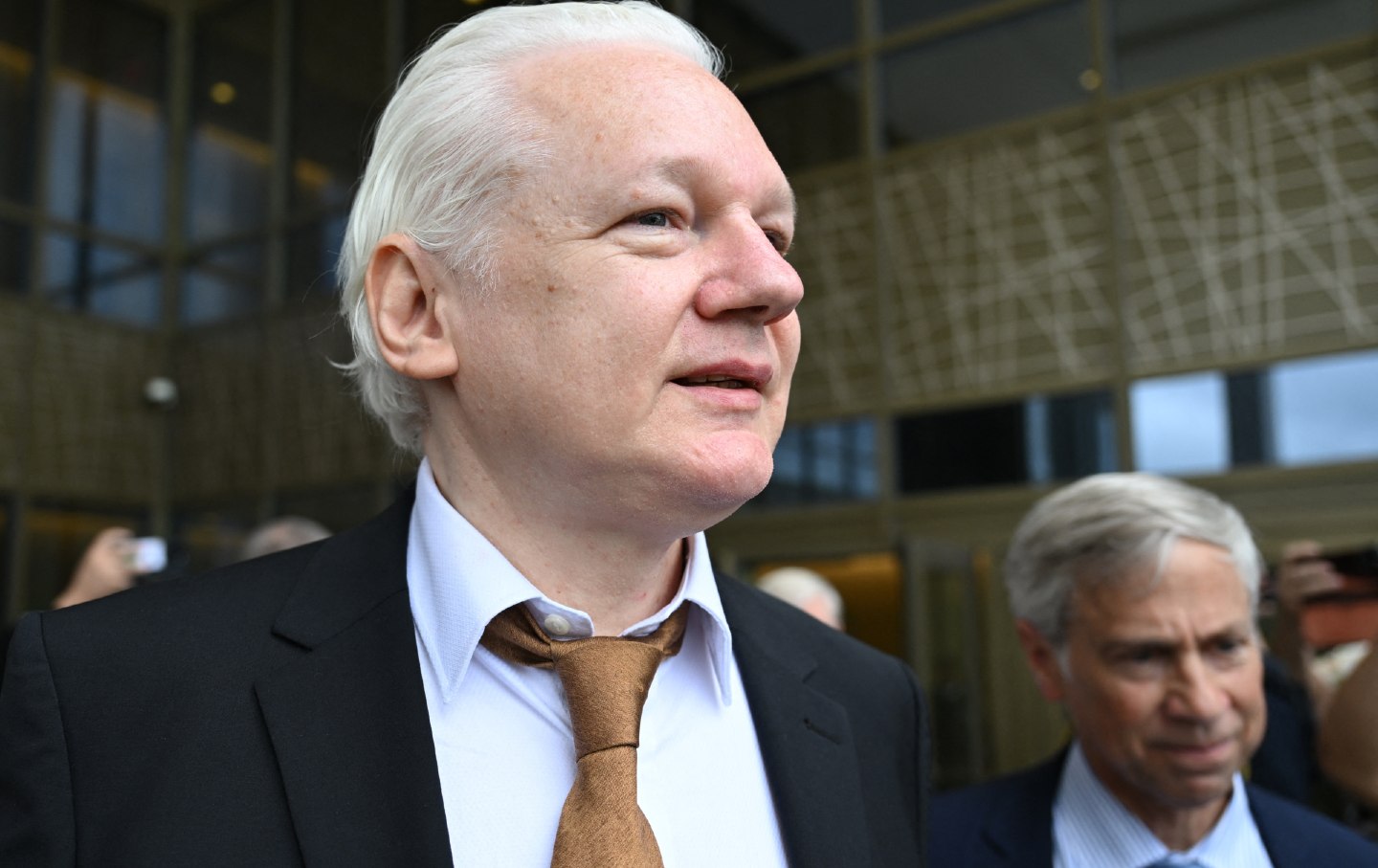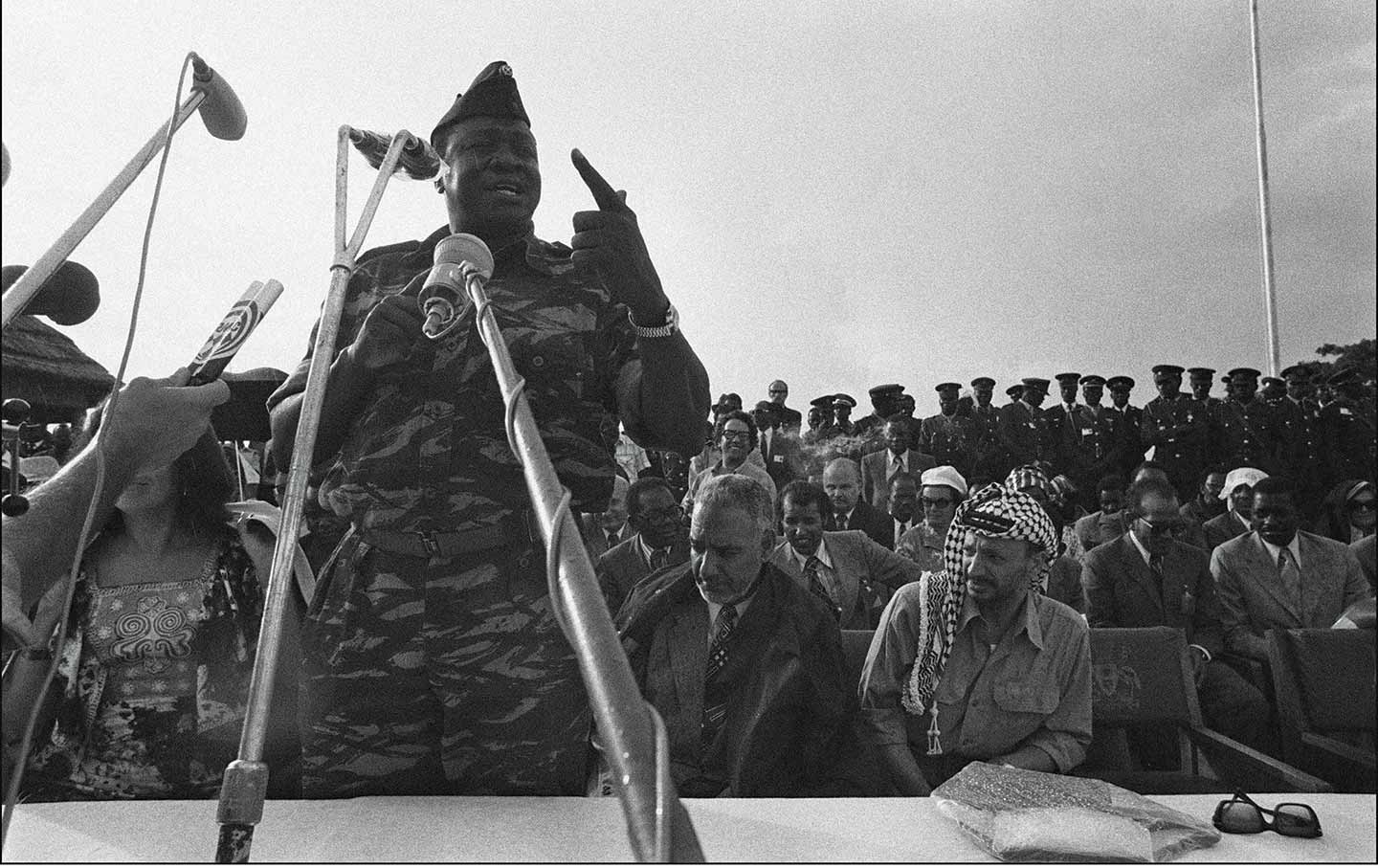Assange’s Case Shows Why Reforming the Espionage Act Is Imperative for Press Freedom
Representative Rashida Tlaib has proposed an amendment to do so.

On June 25, 2024, the 14-year persecution of WikiLeaks founder Julian Assange came to an end. As part of a plea deal, the journalist pleaded guilty to violating the Espionage Act. In exchange, he received time served for the five years he spent in a British maximum-security prison while fighting his extradition. Although Assange walked out of the courthouse a free man, his freedom came after paying an extraordinary harsh price.
Officially, Assange’s crime was “conspiracy to obtain and disclose national defense information.” According to the plea deal, Assange helped to set up WikiLeaks, which announced that it would publish “classified, censored, or otherwise restricted information of political, diplomatic, or ethical significance.” Army Pfc. Chelsea Manning gave Assange national defense information knowing he would publish it. Assange accepted the information and published it.
Missing from the government’s summation of the crime was that this information contained revelations about war crimes, state criminality, and abuses of power. It also omitted that both Manning and Assange were motivated by a belief that by exposing the horrors of war, they could spark a public debate about US foreign policy.
Speaking at his sentencing hearing, Assange explained his crime to the judge by saying, “Working as a journalist I encouraged my source to provide information that was said to be classified in order to publish that information.” Assange stated that he believes these actions were protected by the First Amendment, but “the First Amendment and the Espionage Act are in contradiction with each other”
Assange is right on both counts. His actions were journalistic activities that are protected under the First Amendment. And if they are a crime under the Espionage Act, the 107-year-old law is in contradiction with the First Amendment.
Assange’s plea deal represents the Espionage Act’s latest affront to the First Amendment. As Ralph Engelman and Carey Shenkman document in their definitive history of the law, A Century of Repression: The Espionage Act and Freedom of the Press, the Espionage Act was from its inception designed to suppress political speech. Initially the law was used to prosecute anti-war speech. This outrage against free speech spawned the modern civil liberties movement. Although courts originally rubber-stamped this abuse, belatedly they adopted much of the civil libertarian’s view of the First Amendment, finally ending it.
But the Espionage Act’s century of repression was far from over. It lives on as a weapon against journalists and whistleblowers who expose national security secrets. Here the courts have been far less willing to adopt a civil libertarian approach. In the Pentagon Papers case, the Supreme Court ruled that the First Amendment imposed a high burden on when the government can prevent journalists from publishing state secrets. However, they explicitly declined to state that the First Amendment prohibited a post-publication prosecution of a journalist. Although the case was eventually dismissed due to government misconduct, Pentagon Papers whistleblower Daniel Ellsberg was prosecuted under the Espionage Act. Later courts would also find no First Amendment issue with prosecuting government employees for giving national defense information to the media. Courts’ silence on prosecuting journalists and unwillingness to protect whistleblowers set the stage for our current era of Espionage Act abuse.
Assange was indicted under §793 of the Espionage Act. This provision criminalizes obtaining, retaining, or disclosing national defense information. Although Assange is the first journalist prosecuted under §793, this provision has been used to prosecute whistleblowers. A parallel provision of the Espionage Act applies similar prohibitions to classified communications intelligence. This provision has been used to criminalize disclosures about mass surveillance and drone warfare. A separate section of the Espionage Act is used against actual spies.
The two Espionage Act sections weaponized against journalists and their sources fail to distinguish between spies and those acting in the public interest. They also apply equally to those with a duty to protect classified information and journalists or members of the public.
The Espionage Act creates endless liability. A whistleblower violates it when they give national defense information to a journalist. The journalist breaks it both when they receive the information and when they publish it. And, under the letter of the law, a member of the public who reads the journalist’s reporting and discusses it also breaks the law. While the last scenario may sound far-fetched, statements made in federal court show that federal prosecutors clearly believe that anyone who even shares a New York Times article reporting on national defense information has broken the Espionage Act.
Reforming the Espionage Act requires tackling these problems. The first step to reform is to limit many of its criminal provisions to the government insiders who have promised to protect classified information. This would bar the prosecution of journalists, publishers, or members of the public sharing a news article.
Reforms protecting journalists are not the only ones needed. Press freedom advocates have long argued that prosecuting journalists’ sources is a backdoor war on journalism. Without sources, there is no journalism. And there is a great moral imperative, as well. Government employees who alert the media to abuses of power are whistleblowers to be lauded for their courage, not spies to be prosecuted.
Currently, most sections of the Espionage Act require the defendant have “intent or reason to believe that the information is to be used to the injury of the United States, or to the advantage of any foreign nation” to be guilty. This may sound like a high burden, but prosecutors and courts have worked together to render it meaningless.
The government is not required to prove harm occurred, only that there was reason to believe it might happen. When it comes to security clearances holder, the government argues that by virtue of the information being classified, the whistleblower had reason to believe disclosure would harm the US.
Popular
“swipe left below to view more authors”Swipe →In a recent court filing, the government conceded that the vast majority of those convicted under the Espionage Act for giving information to the media did not have the intent to harm our country. Instead, they acted out of “misguided altruism.”
The Espionage Act must be amended to require the government to prove that those who disclose state secrets acted with the intent to injure the United States. If such a reform were enacted, by the government’s own admission it would have been unable to indict whistleblowers like Ellsberg, Manning, Edward Snowden, or Daniel Hale.
For three years in a row, Representative Rashida Tlaib (D-MI) has proposed an amendment to the National Defense Authorization Act reforming the Espionage Act (note: As policy director of Defending Rights & Dissent, I advised Representative Tlaib’s office on these proposals). The amendment includes both of the aforementioned reforms. It also includes two additional reforms of deep personal importance to whistleblowers. It creates a public interest defense that explicitly protects disclosure about war crimes, human rights abuses, and civil liberties violations. And it allows defendants to testify about the purpose of their disclosures.
While it amends those provisions of the Espionage Act used against journalists and whistleblowers, it leaves those provisions dealing with actual espionage untouched. Although these proposals have been blocked from reaching the floor, they constitute the best road map to reining in the act.
And as Assange’s case illustrates, the government is in desperate need of reining in. Under successive, bipartisan administrations, the Justice Department has argued that basic journalism is a crime under the Espionage Act. It has not merely done so rhetorically but pursued a criminal prosecution based on this theory. This will chill journalists the same way past prosecutions have already intimidated whistleblowers.
The First Amendment protects not only news gathering but also citizens’ right to receive information and ideas. The use of the Espionage Act against journalists and whistleblowers attacks both our free press and our right to know. For too long, the Espionage Act has been allowed to cast a shadow over the First Amendment. And as the Assange case illustrates, reforming this draconic relic of repression is imperative for preserving press freedom.
Disobey authoritarians, support The Nation
Over the past year you’ve read Nation writers like Elie Mystal, Kaveh Akbar, John Nichols, Joan Walsh, Bryce Covert, Dave Zirin, Jeet Heer, Michael T. Klare, Katha Pollitt, Amy Littlefield, Gregg Gonsalves, and Sasha Abramsky take on the Trump family’s corruption, set the record straight about Robert F. Kennedy Jr.’s catastrophic Make America Healthy Again movement, survey the fallout and human cost of the DOGE wrecking ball, anticipate the Supreme Court’s dangerous antidemocratic rulings, and amplify successful tactics of resistance on the streets and in Congress.
We publish these stories because when members of our communities are being abducted, household debt is climbing, and AI data centers are causing water and electricity shortages, we have a duty as journalists to do all we can to inform the public.
In 2026, our aim is to do more than ever before—but we need your support to make that happen.
Through December 31, a generous donor will match all donations up to $75,000. That means that your contribution will be doubled, dollar for dollar. If we hit the full match, we’ll be starting 2026 with $150,000 to invest in the stories that impact real people’s lives—the kinds of stories that billionaire-owned, corporate-backed outlets aren’t covering.
With your support, our team will publish major stories that the president and his allies won’t want you to read. We’ll cover the emerging military-tech industrial complex and matters of war, peace, and surveillance, as well as the affordability crisis, hunger, housing, healthcare, the environment, attacks on reproductive rights, and much more. At the same time, we’ll imagine alternatives to Trumpian rule and uplift efforts to create a better world, here and now.
While your gift has twice the impact, I’m asking you to support The Nation with a donation today. You’ll empower the journalists, editors, and fact-checkers best equipped to hold this authoritarian administration to account.
I hope you won’t miss this moment—donate to The Nation today.
Onward,
Katrina vanden Heuvel
Editor and publisher, The Nation
More from The Nation

Mahmood Mamdani’s Uganda Mahmood Mamdani’s Uganda
In his new book Slow Poison, the accomplished anthropologist revisits the Idi Amin and Yoweri Museveni years.

The US Is Looking More Like Putin’s Russia Every Day The US Is Looking More Like Putin’s Russia Every Day
We may already be on a superhighway to the sort of class- and race-stratified autocracy that it took Russia so many years to become after the Soviet Union collapsed.

Israel Wants to Destroy My Family's Way of Life. We'll Never Give In. Israel Wants to Destroy My Family's Way of Life. We'll Never Give In.
My family's olive trees have stood in Gaza for decades. Despite genocide, drought, pollution, toxic mines, uprooting, bulldozing, and burning, they're still here—and so are we.

Trump’s National Security Strategy and the Big Con Trump’s National Security Strategy and the Big Con
Sense, nonsense, and lunacy.

Does Russian Feminism Have a Future? Does Russian Feminism Have a Future?
A Russian feminist reflects on Julia Ioffe’s history of modern Russia.

Ukraine’s War on Its Unions Ukraine’s War on Its Unions
Since the start of the war, the Ukrainian government has been cracking down harder on unions and workers’ rights. But slowly, the public mood is shifting.


